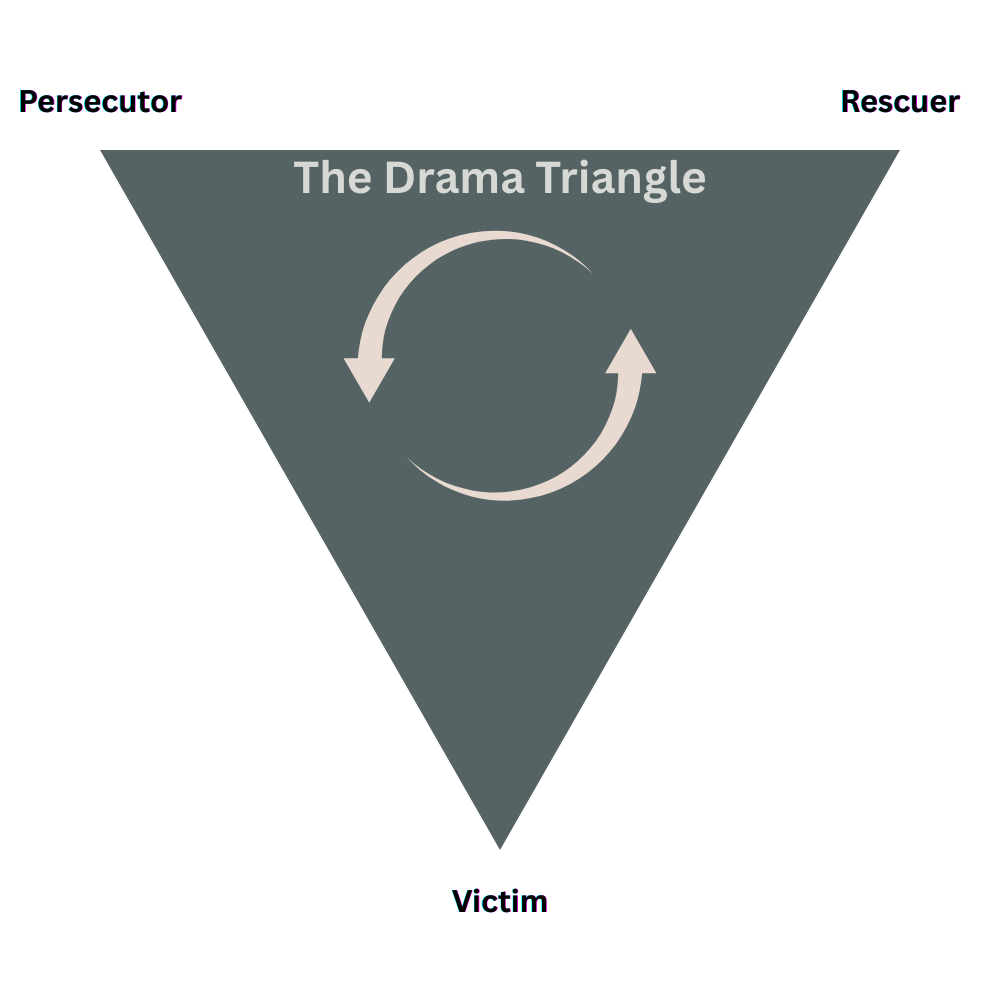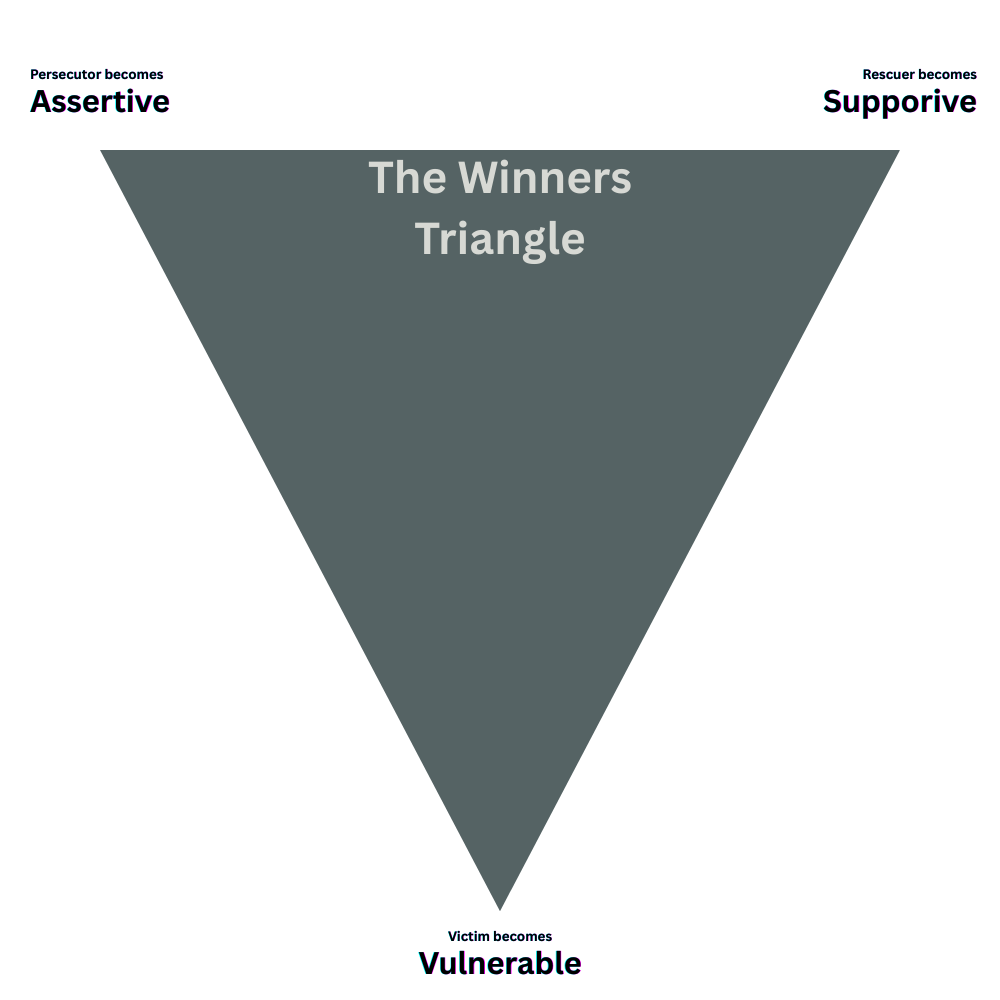One framework I return to again and again, in both my personal life and in client work, is the Drama Triangle. It's a simple yet powerful way of noticing the patterns we fall into when things start to feel messy in relationships, or when we sense we're caught up in what Transactional Analysis (TA) calls "games."
The Drama Triangle was first described by Dr. Stephen Karpman in 1972 in his paper Fairy Tales and Script Drama. TA is a school of psychotherapy that looks at how we relate to ourselves and others through different "ego states" (Child, Parent, Adult). It captures how easily we can get swept into repetitive, inauthentic roles that don't serve us or anyone else.

The Drama Triangle: Victim, Rescuer, and Persecutor roles
The Three Roles
The Drama Triangle has three roles. They mirror the characters of any fairy tale: the victim, the rescuer, and the persecutor. Each role discounts something, our own strengths, or the strengths and dignity of others. And we can switch between them in the blink of an eye.
The Victim
- Says: "I'm helpless."
- Discounts their own resources and power.
- Looks for a rescuer to save them or a persecutor to confirm their stuckness.
- Comes from the vulnerable but trapped Adapted Child part of us.
The Rescuer
- Says: "I'll do that for you."
- Discounts the other person's ability to manage for themselves.
- Ignores their own needs while rushing in to help.
- Comes from the negative Nurturing Parent part.
The Persecutor
- Says: "You'll do it because I say so."
- Discounts the feelings and worth of others.
- Controls through criticism, blame, or domination.
- Comes from the negative Controlling Parent part.
Often, the "game" of the drama triangle is that people shift between these roles, sometimes in the same conversation, keeping the dynamic alive and leaving nobody feeling satisfied.
A good barometer that you may be slipping into the triangle is the sense that something false or performative is happening, that you or someone else is playing a "role" rather than being authentic.
Moving to the Winner's Triangle
The good news is we don't have to stay caught in the Drama Triangle. There's a healthier option, known as the Winner's Triangle. This involves stepping into the Adult part of ourselves and transforming each role into something healthier:
- Victim → Vulnerable: Instead of staying helpless, we acknowledge our feelings and voice our needs directly. This is about honesty and openness.
- Rescuer → Supportive: Rather than rushing in to fix things, we support others to find their own solutions and honour their autonomy.
- Persecutor (Aggressor) → Assertive: Instead of blaming or criticising, we set clear boundaries and communicate what matters in a respectful way.

The Winner's Triangle: Vulnerable, Resourceful, and Assertive roles
How It Plays Out
People can and do switch roles rapidly within a single interaction.
In the Drama Triangle
Imagine someone at work offers to stay late and finish a colleague's report (Rescuer). The colleague politely declines, saying they'll manage. The helper suddenly feels unappreciated and mutters to themselves, "After all I do, nobody values me" (Victim). Later, when the stress boils over, they snap at the same colleague for being disorganised (Persecutor).
All three roles are played out in a single cycle, each discounting something real: the Rescuer discounts the colleague's ability to manage, the Victim discounts their own resilience, and the Persecutor discounts the other's dignity.
In the Winner's Triangle
Now imagine the same scenario, but with a different approach:
- Vulnerable (instead of Victim): The colleague says, "I'm under pressure with this deadline and I'm feeling stressed, but I'd like to manage it myself. Could you check in with me later?" They acknowledge their feelings and ask directly for what they need.
- Supportive (instead of Rescuer): The helper replies, "I hear you. Let me know if there's a specific way I can support, but I trust you've got this." They encourage without taking over.
- Assertive (instead of Persecutor): If the deadline is crucial, a manager might add, "I need that report by tomorrow morning. If you run into obstacles, come to me early so we can solve it together." This sets a boundary without blame.
The same pressures and challenges are present, but this time the interaction honours both parties' needs, boundaries, and dignity. What could have spiralled into drama instead becomes a moment of genuine collaboration.
Why It Matters
The Drama Triangle gives us language and awareness for patterns that often feel confusing or draining. Simply noticing which role we're in can be enough to step back and choose differently. And moving into the Winner's Triangle allows us to relate in ways that are more truthful, respectful, and empowering, for ourselves and for others.
It's not about never slipping into drama (we're human, after all), but about recognising it sooner and choosing a different way.
Need Support with Relationship Patterns in Dublin? If you're struggling with relationship patterns or would like to explore these concepts further in a safe, professional environment, I'm here to help. Contact me to arrange a free 15-minute consultation for psychotherapy services in Dublin.
References
Choy, A. (1990). The Winner's Triangle. Transactional Analysis Journal, 20(1), 40–46.
Karpman, S. (1968). Fairy tales and script drama analysis. Transactional Analysis Bulletin, 7(26), 39–43.